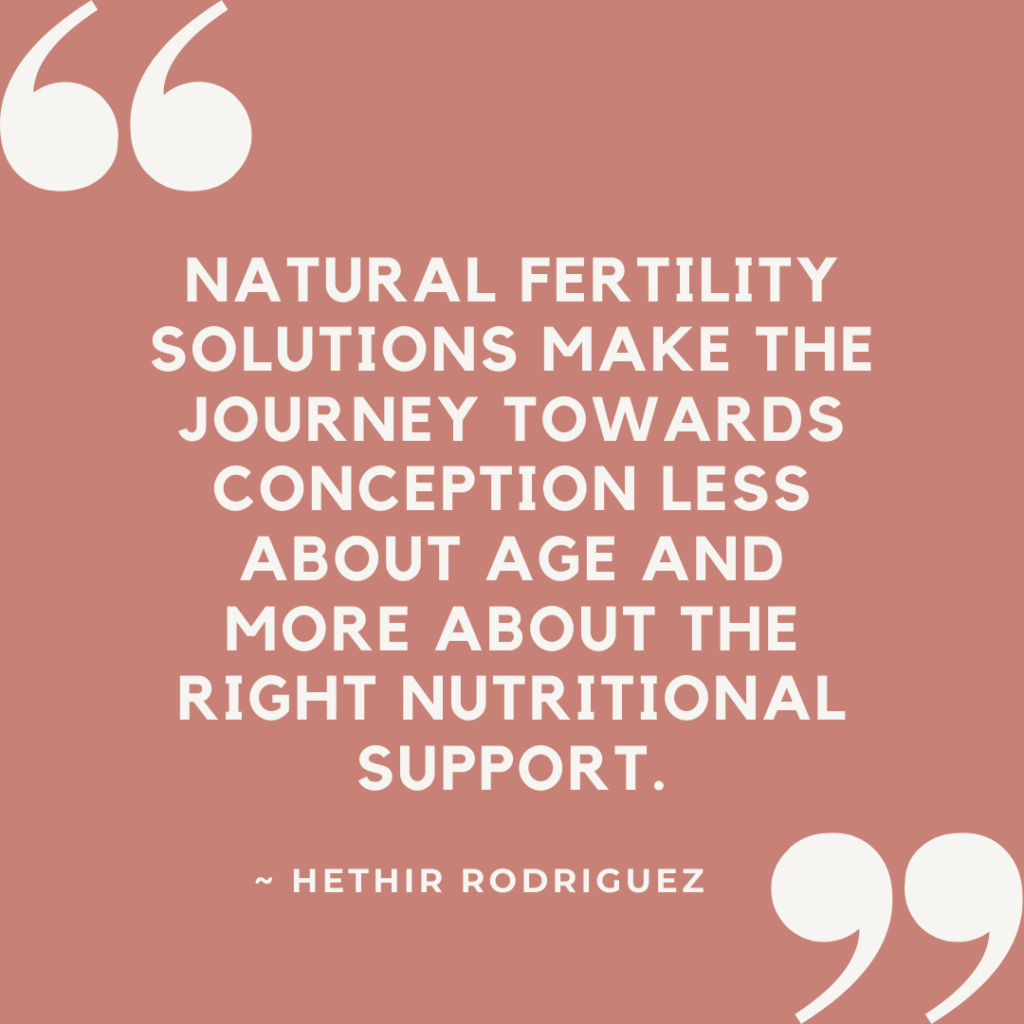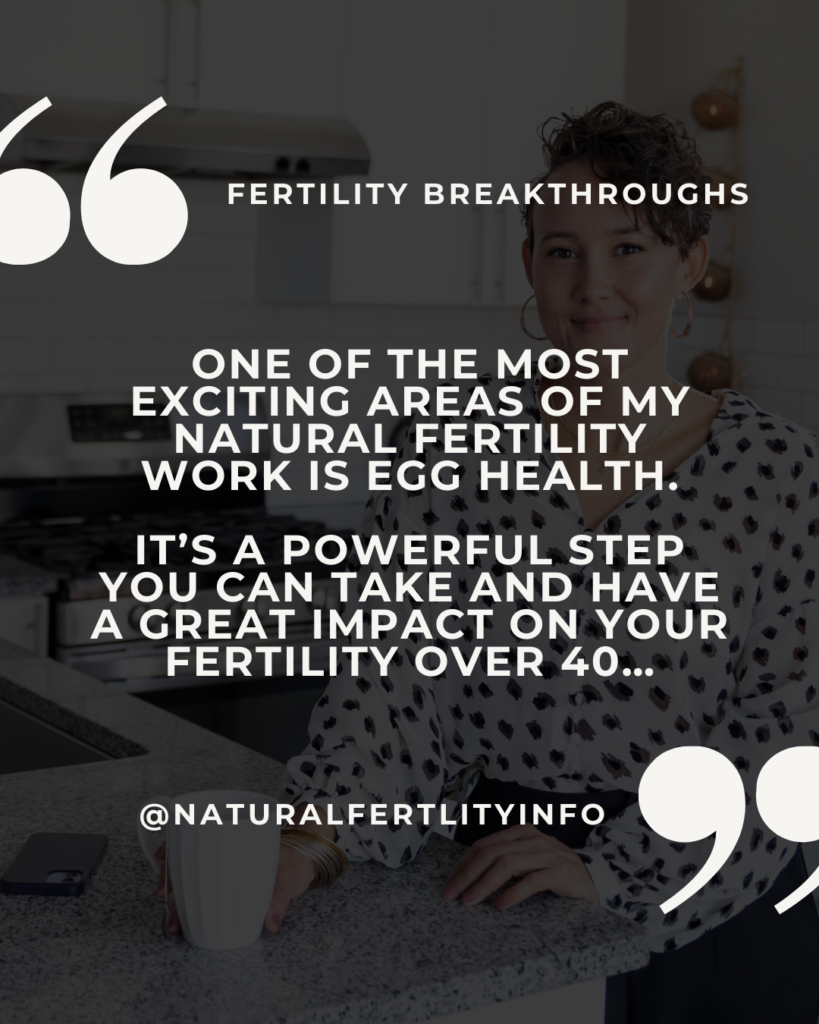Are you tired of constantly hearing warnings about your age limiting your chances of getting pregnant? The perpetual ticking biological clock? It’s a narrative almost every woman over 35 faces.
The fear of declining egg quality as you age is not just a scare tactic; it’s a reality many face.
The stark reminder that each year beyond 35 could lessen your chances of conceiving naturally is a heavy burden. But what if there was something you could do about it by using science and nature to defy the odds?
Today I am here to share with you exactly how to do this using 100% natural methods. This dramatically increases the odds in your favor. Here is how.

How To Affect Egg Health
To get started here’s what you need to know first. These are the body’s factors that mostly control egg cell, ovulation, and embryo quality.
Support these functions and you found the key to egg health.
- Oxidative Stress: A condition where there is an imbalance between free radicals (unstable molecules that can cause damage) and antioxidants in your body. This can damage cells, proteins, and DNA, affecting overall health including fertility.
- Mitochondrial Activity: The process by which mitochondria, the powerhouses of the cell, produce energy. In the context of fertility, healthy mitochondrial activity is crucial for supporting the energy needs of egg cells and embryos, contributing to their growth and development.
- Egg Cycle & Cell: The egg cycle refers to the process of an egg (oocyte) maturing and being released from the ovary, which is part of a woman’s menstrual cycle. An egg cell, or oocyte, is the female reproductive cell that, if fertilized by a sperm, can develop into an embryo.
- The Follicle: A small fluid-filled sac in the ovary that contains and supports the maturing egg cell. Once the egg is mature, the follicle breaks open to release the egg, a process known as ovulation.
- Embryo: The early stage of development for a fertilized egg (after a sperm has fertilized an egg) that will eventually develop into a fetus. The embryo stage covers the first eight weeks of pregnancy.
- Ovulation: The phase in the menstrual cycle when a mature egg is released from the ovary into the fallopian tube, where it can be fertilized by sperm. Ovulation typically occurs around the middle of a woman’s menstrual cycle.
- Implantation: The process by which a fertilized egg (embryo) attaches itself to the wall of the uterus where it can then grow and develop into a baby. Implantation usually occurs about 6 to 10 days after fertilization.
However, the battle for fertility doesn’t end as the years advance. Through the power of antioxidants there’s a scientifically-backed beacon of hope.
These aren’t just any nutrients; they are your allies in enhancing egg health, reducing oxidative stress, and boosting mitochondrial efficiency crucial for cell health and reproductive function.
The introduction of specific antioxidants can dramatically improve your odds, making the journey towards conception less about age and more about the right nutritional support.
This isn’t just about overcoming a biological challenge; it’s about empowering yourself with knowledge and tools to foster a conducive environment for pregnancy.
The Role of Antioxidants in Fertility
First, let’s talk about antioxidants. These are like your body’s personal defense team against oxidative stress. Oxidative stress can impact your cells, including your precious egg cells.
Oxidative stress is a bit like rust on a car – it causes wear and tear. In the fertility world, antioxidants come in to polish and protect your eggs from this damage.
Antioxidants are crucial in combating oxidative stress. Oxidative stress can harm cellular health, including that of egg cells. Oxidative stress can lead to cellular damage, akin to a biological ‘wear and tear.’
Antioxidants help mitigate this damage, providing a protective effect on reproductive cells.
When it comes to antioxidants there are many different types and they each have a different job in the body. Not all antioxidants are beneficial for egg health.
I am going to share with you the most important antioxidants as well as how to get them all in one simple supplement you can take daily.
PQQ (pyrroloquinoline-quinine)
PQQ is an antioxidant known for its cell-protective qualities. It’s particularly good at reducing oxidative stress and the aging effects on cells. It’s shown to enhance markers linked to fertility and ovarian function.
Additionally, PQQ promotes mitochondrial efficiency. This is vital for cell health and reproductive function.
Recent studies show that PQQ can improve ovarian function. For example, one study published in ‘Reproductive Biology and Endocrinology’ (2023) found this.
It increases the quality of oocytes and does this by reducing oxidative stress and enhancing mitochondrial activity.
NAC (N-acetylcysteine)
N-acetylcysteine, or NAC, plays a significant role in supporting embryo quality. It provides a defense against oxidative stress. This is important for healthy embryo development as it improves the chances of a successful pregnancy.
A study in ‘The Journal of Maternal-Fetal & Neonatal Medicine’ (2023) indicated that NAC supplementation could improve embryo quality. It does this by reducing oxidative stress and enhancing the intrauterine environment. This is crucial for embryo implantation and growth.
L Glutathione
L Glutathione is known for its ability to guard against oxidative stress. It also supports the detoxification processes in the ovaries. This ensures a healthier environment for oocytes. This antioxidant is integral in maintaining optimal egg health.”
L Glutathione is a powerful antioxidant. It is naturally produced in the body and found in foods like garlic, onions, and cruciferous vegetables. A 2022 study in ‘Fertility and Sterility’ revealed that taking L Glutathione supplements improved egg quality. It did this by protecting the oocytes from oxidative stress. It also supported the detoxification processes in the ovaries.

ALA (alpha lipoic acid)
Alpha Lipoic Acid, or ALA, supports egg quality, fertilization rates, and embryo development. It works by enhancing the quality of the oocytes. This contributes to better fertilization outcomes and embryo health.
ALA is a naturally occurring compound that acts as a powerful antioxidant. It’s found in spinach, broccoli, and potatoes. Research published in ‘The Journal of Endocrinology’ (2023) showed that ALA supplementation could significantly improve egg quality. It also increased fertilization rates. This happened by enhancing mitochondrial function in oocytes.
Selenium
Selenium is an essential mineral. It plays a key role in protecting against oxidative stress. It’s known to improve oocyte production and increase follicle count. Selenium also supports glutathione production, an antioxidant critical for reproductive health.”
Selenium, a trace mineral, is essential for human health. It’s found in Brazil nuts, seafood, and grains. A 2023 study in ‘The Journal of Trace Elements in Medicine and Biology’ showed that selenium supplementation improved follicle development. It also improved egg cell quality. This was likely because selenium reduces oxidative stress and supports glutathione production.
Vitamin E
Vitamin E is essential for reproductive health, functioning as a potent antioxidant. It protects the reproductive system. It ensures that reproductive processes function healthily.
Vitamin E, a fat-soluble vitamin, found in nuts, seeds, and green leafy vegetables. A 2022 study in ‘The American Journal of Reproductive Immunology’ highlighted that Vitamin E supplementation improves reproductive health. It reduces oxidative stress in the reproductive system and improves the endometrial response.
Vitamin C
Vitamin C is crucial not only for general health but also for reproductive health. It is necessary for regular ovulation. Vitamin C acts as a powerful antioxidant helping to protect the reproductive system and enhances its overall functioning.
Vitamin C is a water-soluble vitamin. It is abundant in citrus fruits, strawberries, and bell peppers. A 2023 study in ‘Human Reproduction’ found that regularly taking Vitamin C improves ovulation regularity and oocyte quality. Vitamin C’s antioxidant properties protect the ovaries and eggs from oxidative damage.
How To Get Started Supporting Your Egg Health
Today, we’ve journeyed through the science of fertility, exploring how targeted nutrients can significantly enhance egg quality and fertility, even beyond the age of 35.
It’s a testament to how advancements in health and nutrition can open new doors for those looking to conceive. With the right approach, the years can become just a number, not a barrier.
Excitingly, you don’t need to source each of these ingredients separately. We’ve thoughtfully combined them in our Fertilica OvaWise Antioxidant supplement formula.
This blend is designed to provide a comprehensive solution. It makes it easier for you to get the right balance of these crucial antioxidants.
Remember, supplements are valuable tools. They work best as part of a holistic approach to fertility. This approach includes a balanced diet, regular exercise, and overall wellness practices.
Get The 90 Day Egg Health Checklist
Ready to take control of your fertility journey with a natural approach? Sign up for our 90 Day Egg Health Checklist today! This comprehensive guide outlines all the steps you need to take to support your egg health naturally.
We’ll walk you through every strategy that can make a difference. From targeted nutrition to lifestyle adjustments. Embark on a journey to enhance your fertility with confidence and clarity.
Your path to better egg health starts here—join us now and transform your approach to conception.





